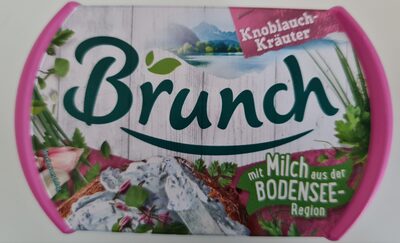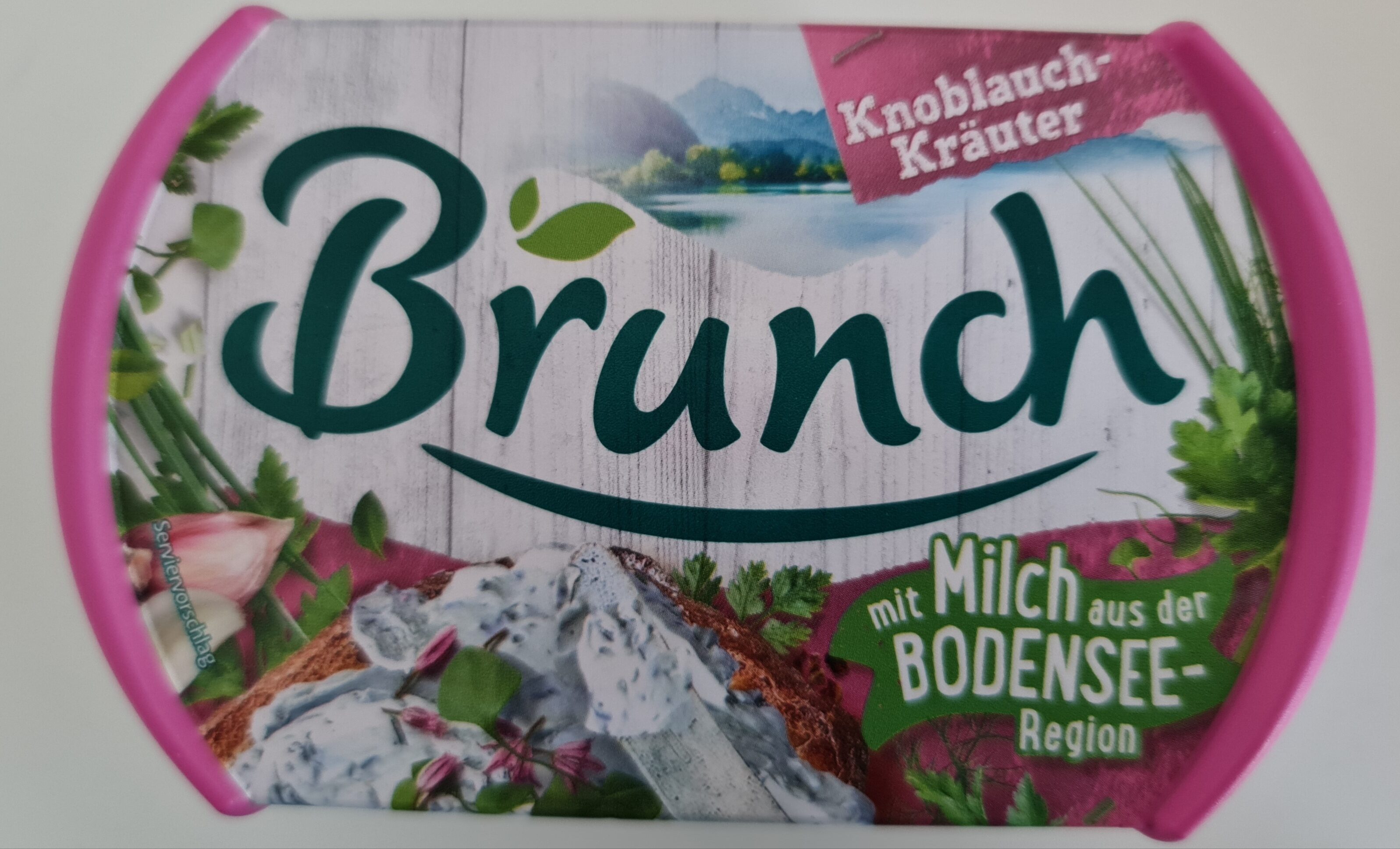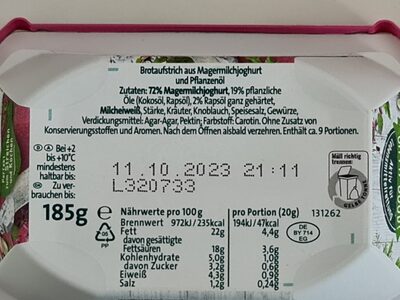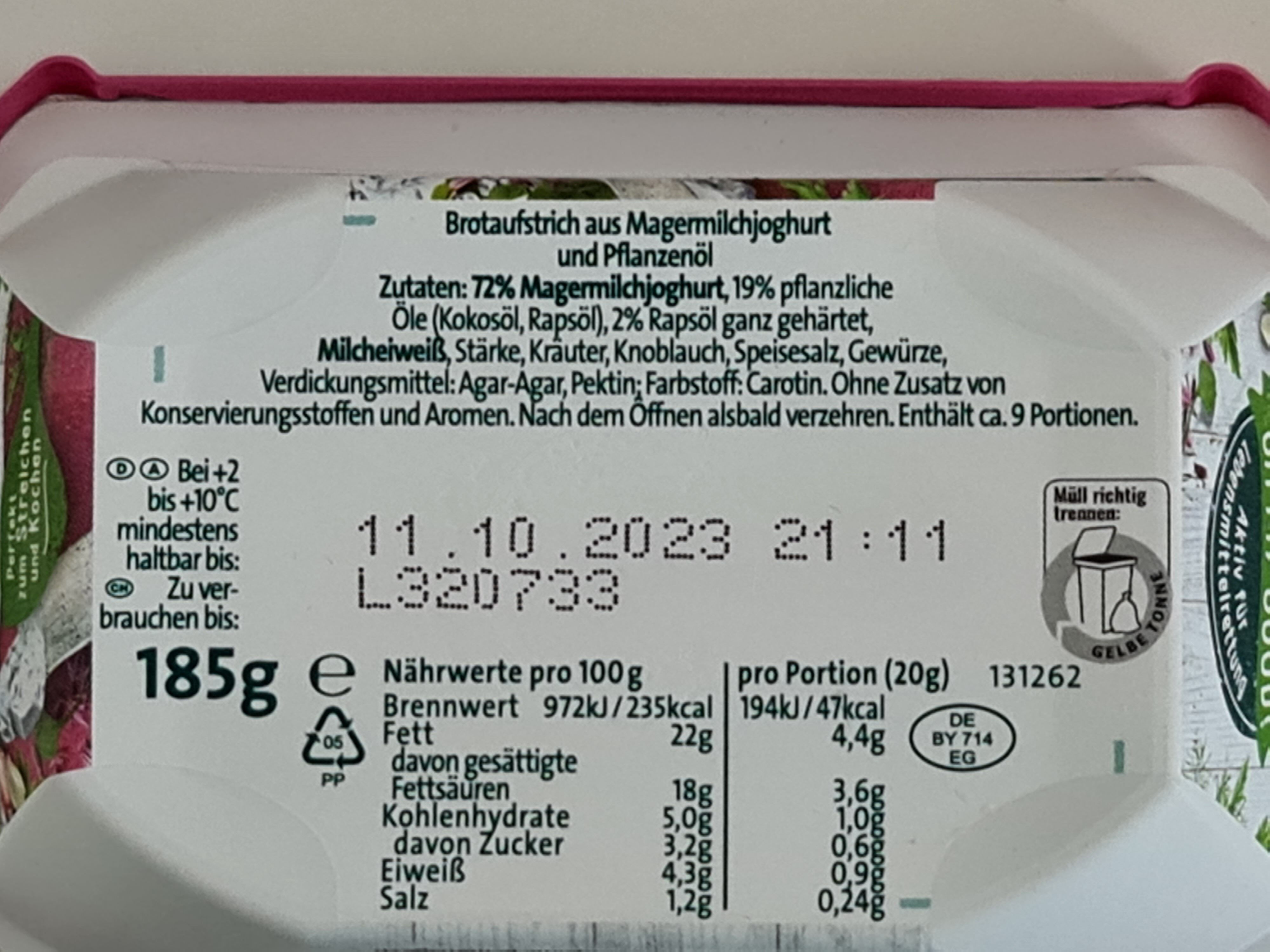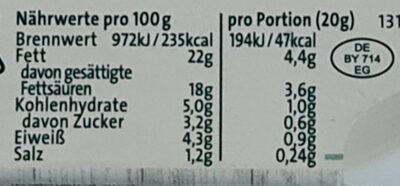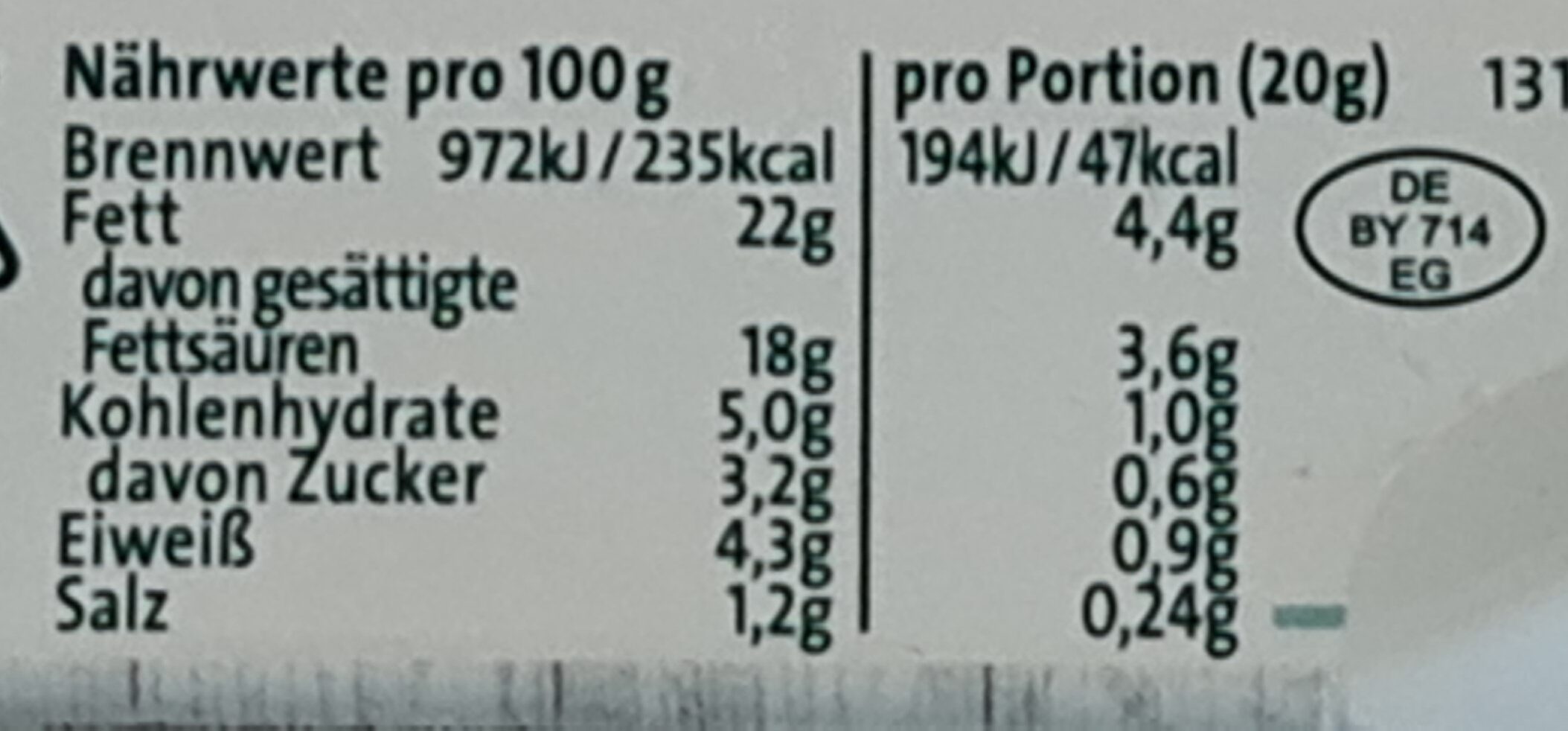Help us make food transparency the norm!
As a non-profit organization, we depend on your donations to continue informing consumers around the world about what they eat.
The food revolution starts with you!
Brunch - Knoblauch-Kräuter - Edelweiss - 185 g
Brunch - Knoblauch-Kräuter - Edelweiss - 185 g
This product page is not complete. You can help to complete it by editing it and adding more data from the photos we have, or by taking more photos using the app for Android or iPhone/iPad. Thank you!
×
Barcode: 4045357010469 (EAN / EAN-13)
Quantity: 185 g
Categories: Dairies, Fermented foods, Fermented milk products, Cheeses, Spreads, Salted spreads, Cheese spreads, Cream cheeses
Traceability code: DE BY-714 EG
Countries where sold: Germany
Matching with your preferences
Health
Ingredients
-
16 ingredients
German: 72% Magermilchjoghurt, 19% pflanzliche Öle (Kokosöl, Rapsöl), 2% Rapsöl ganz gehärtet, Milcheiweiß, Stärke, Kräuter, Knoblauch, Speisesalz, Gewürze, Verdickungsmittel: Agar-Agar, Pektin; Farbstoff: Carotin.Allergens: Milk
Food processing
-
Ultra processed foods
Elements that indicate the product is in the 4 - Ultra processed food and drink products group:
- Additive: E160a - Carotene
- Additive: E406 - Agar
- Additive: E440 - Pectins
- Ingredient: Colour
- Ingredient: Milk proteins
- Ingredient: Thickener
Food products are classified into 4 groups according to their degree of processing:
- Unprocessed or minimally processed foods
- Processed culinary ingredients
- Processed foods
- Ultra processed foods
The determination of the group is based on the category of the product and on the ingredients it contains.
Additives
-
E160a - Carotene
Carotene: The term carotene -also carotin, from the Latin carota, "carrot"- is used for many related unsaturated hydrocarbon substances having the formula C40Hx, which are synthesized by plants but in general cannot be made by animals -with the exception of some aphids and spider mites which acquired the synthesizing genes from fungi-. Carotenes are photosynthetic pigments important for photosynthesis. Carotenes contain no oxygen atoms. They absorb ultraviolet, violet, and blue light and scatter orange or red light, and -in low concentrations- yellow light. Carotenes are responsible for the orange colour of the carrot, for which this class of chemicals is named, and for the colours of many other fruits, vegetables and fungi -for example, sweet potatoes, chanterelle and orange cantaloupe melon-. Carotenes are also responsible for the orange -but not all of the yellow- colours in dry foliage. They also -in lower concentrations- impart the yellow coloration to milk-fat and butter. Omnivorous animal species which are relatively poor converters of coloured dietary carotenoids to colourless retinoids have yellowed-coloured body fat, as a result of the carotenoid retention from the vegetable portion of their diet. The typical yellow-coloured fat of humans and chickens is a result of fat storage of carotenes from their diets. Carotenes contribute to photosynthesis by transmitting the light energy they absorb to chlorophyll. They also protect plant tissues by helping to absorb the energy from singlet oxygen, an excited form of the oxygen molecule O2 which is formed during photosynthesis. β-Carotene is composed of two retinyl groups, and is broken down in the mucosa of the human small intestine by β-carotene 15‚15'-monooxygenase to retinal, a form of vitamin A. β-Carotene can be stored in the liver and body fat and converted to retinal as needed, thus making it a form of vitamin A for humans and some other mammals. The carotenes α-carotene and γ-carotene, due to their single retinyl group -β-ionone ring-, also have some vitamin A activity -though less than β-carotene-, as does the xanthophyll carotenoid β-cryptoxanthin. All other carotenoids, including lycopene, have no beta-ring and thus no vitamin A activity -although they may have antioxidant activity and thus biological activity in other ways-. Animal species differ greatly in their ability to convert retinyl -beta-ionone- containing carotenoids to retinals. Carnivores in general are poor converters of dietary ionone-containing carotenoids. Pure carnivores such as ferrets lack β-carotene 15‚15'-monooxygenase and cannot convert any carotenoids to retinals at all -resulting in carotenes not being a form of vitamin A for this species-; while cats can convert a trace of β-carotene to retinol, although the amount is totally insufficient for meeting their daily retinol needs.Source: Wikipedia
-
E406 - Agar
Agar: Agar -pronounced , sometimes - or agar-agar is a jelly-like substance, obtained from red algae.Agar is a mixture of two components: the linear polysaccharide agarose, and a heterogeneous mixture of smaller molecules called agaropectin. It forms the supporting structure in the cell walls of certain species of algae, and is released on boiling. These algae are known as agarophytes, and belong to the Rhodophyta -red algae- phylum.Agar has been used as an ingredient in desserts throughout Asia, and also as a solid substrate to contain culture media for microbiological work. Agar can be used as a laxative, an appetite suppressant, a vegetarian substitute for gelatin, a thickener for soups, in fruit preserves, ice cream, and other desserts, as a clarifying agent in brewing, and for sizing paper and fabrics.The gelling agent in agar is an unbranched polysaccharide obtained from the cell walls of some species of red algae, primarily from tengusa -Gelidiaceae- and ogonori -Gracilaria-. For commercial purposes, it is derived primarily from ogonori. In chemical terms, agar is a polymer made up of subunits of the sugar galactose.Source: Wikipedia
-
E440 - Pectins
Pectins (E440) are natural carbohydrates, predominantly found in fruits, that act as gelling agents in the food industry, creating the desirable jelly-like texture in jams, jellies, and marmalades.
Pectins stabilize and thicken various food products, such as desserts, confectioneries, and beverages, ensuring a uniform consistency and quality.
Recognized as safe by various health authorities, pectins have been widely used without notable adverse effects when consumed in typical dietary amounts.
Ingredients analysis
-
May contain palm oil
Ingredients that may contain palm oil: E160a
-
Non-vegan
Non-vegan ingredients: Skimmed yogurt, Milk proteinsSome ingredients could not be recognized.
We need your help!
You can help us recognize more ingredients and better analyze the list of ingredients for this product and others:
- Edit this product page to correct spelling mistakes in the ingredients list, and/or to remove ingredients in other languages and sentences that are not related to the ingredients.
- Add new entries, synonyms or translations to our multilingual lists of ingredients, ingredient processing methods, and labels.
If you would like to help, join the #ingredients channel on our Slack discussion space and/or learn about ingredients analysis on our wiki. Thank you!
-
Vegetarian status unknown
Unrecognized ingredients: de:rapsöl-ganz-gehärtetSome ingredients could not be recognized.
We need your help!
You can help us recognize more ingredients and better analyze the list of ingredients for this product and others:
- Edit this product page to correct spelling mistakes in the ingredients list, and/or to remove ingredients in other languages and sentences that are not related to the ingredients.
- Add new entries, synonyms or translations to our multilingual lists of ingredients, ingredient processing methods, and labels.
If you would like to help, join the #ingredients channel on our Slack discussion space and/or learn about ingredients analysis on our wiki. Thank you!
-
Details of the analysis of the ingredients
We need your help!
Some ingredients could not be recognized.
We need your help!
You can help us recognize more ingredients and better analyze the list of ingredients for this product and others:
- Edit this product page to correct spelling mistakes in the ingredients list, and/or to remove ingredients in other languages and sentences that are not related to the ingredients.
- Add new entries, synonyms or translations to our multilingual lists of ingredients, ingredient processing methods, and labels.
If you would like to help, join the #ingredients channel on our Slack discussion space and/or learn about ingredients analysis on our wiki. Thank you!
de: Magermilchjoghurt 72%, pflanzliche Öle 19% (Kokosöl, Rapsöl), Rapsöl ganz gehärtet 2%, Milcheiweiß, Stärke, Kräuter, Knoblauch, Speisesalz, Gewürze, Verdickungsmittel (Agar-Agar), Pektin, Farbstoff (Carotin)- Magermilchjoghurt -> en:skimmed-yogurt - vegan: no - vegetarian: yes - ciqual_proxy_food_code: 19593 - percent_min: 72 - percent: 72 - percent_max: 72
- pflanzliche Öle -> en:vegetable-oil - vegan: yes - vegetarian: yes - from_palm_oil: maybe - percent_min: 19 - percent: 19 - percent_max: 19
- Kokosöl -> en:coconut-oil - vegan: yes - vegetarian: yes - from_palm_oil: no - ciqual_food_code: 16040 - percent_min: 9.5 - percent_max: 19
- Rapsöl -> en:rapeseed-oil - vegan: yes - vegetarian: yes - from_palm_oil: no - percent_min: 0 - percent_max: 9.5
- Rapsöl ganz gehärtet -> de:rapsöl-ganz-gehärtet - percent_min: 2 - percent: 2 - percent_max: 2
- Milcheiweiß -> en:milk-proteins - vegan: no - vegetarian: yes - percent_min: 0.777777777777778 - percent_max: 2
- Stärke -> en:starch - vegan: yes - vegetarian: yes - ciqual_proxy_food_code: 9510 - percent_min: 0.625 - percent_max: 2
- Kräuter -> en:herb - vegan: yes - vegetarian: yes - percent_min: 0.428571428571429 - percent_max: 1.89930555555556
- Knoblauch -> en:garlic - vegan: yes - vegetarian: yes - ciqual_food_code: 11000 - percent_min: 0.183449074074074 - percent_max: 1.43373015873016
- Speisesalz -> en:salt - vegan: yes - vegetarian: yes - ciqual_food_code: 11058 - percent_min: 0 - percent_max: 1.2
- Gewürze -> en:spice - vegan: yes - vegetarian: yes - percent_min: 0 - percent_max: 0.997885959939532
- Verdickungsmittel -> en:thickener - percent_min: 0 - percent_max: 0.87315021494709
- Agar-Agar -> en:e406 - vegan: yes - vegetarian: yes - ciqual_food_code: 11084 - percent_min: 0 - percent_max: 0.87315021494709
- Pektin -> en:e440a - vegan: yes - vegetarian: yes - percent_min: 0 - percent_max: 0.776133524397414
- Farbstoff -> en:colour - percent_min: 0 - percent_max: 0.698520171957672
- Carotin -> en:e160a - vegan: maybe - vegetarian: maybe - from_palm_oil: maybe - percent_min: 0 - percent_max: 0.698520171957672
Nutrition
-
Poor nutritional quality
⚠ ️Warning: the amount of fiber is not specified, their possible positive contribution to the grade could not be taken into account.⚠ ️Warning: the amount of fruits, vegetables and nuts is not specified on the label, it was estimated from the list of ingredients: 5This product is not considered a beverage for the calculation of the Nutri-Score.
Positive points: 2
- Proteins: 2 / 5 (value: 4.3, rounded value: 4.3)
- Fiber: 0 / 5 (value: 0, rounded value: 0)
- Fruits, vegetables, nuts, and colza/walnut/olive oils: 0 / 5 (value: 5.55858961640212, rounded value: 5.6)
Negative points: 17
- Energy: 2 / 10 (value: 972, rounded value: 972)
- Sugars: 0 / 10 (value: 3.2, rounded value: 3.2)
- Saturated fat: 10 / 10 (value: 18, rounded value: 18)
- Sodium: 5 / 10 (value: 480, rounded value: 480)
The points for proteins are counted because the product is in the cheeses category.
Nutritional score: (17 - 2)
Nutri-Score:
-
Nutrient levels
-
Fat in high quantity (22%)
What you need to know- A high consumption of fat, especially saturated fats, can raise cholesterol, which increases the risk of heart diseases.
Recommendation: Limit the consumption of fat and saturated fat- Choose products with lower fat and saturated fat content.
-
Saturated fat in high quantity (18%)
What you need to know- A high consumption of fat, especially saturated fats, can raise cholesterol, which increases the risk of heart diseases.
Recommendation: Limit the consumption of fat and saturated fat- Choose products with lower fat and saturated fat content.
-
Sugars in low quantity (3.2%)
What you need to know- A high consumption of sugar can cause weight gain and tooth decay. It also augments the risk of type 2 diabetes and cardio-vascular diseases.
Recommendation: Limit the consumption of sugar and sugary drinks- Sugary drinks (such as sodas, fruit beverages, and fruit juices and nectars) should be limited as much as possible (no more than 1 glass a day).
- Choose products with lower sugar content and reduce the consumption of products with added sugars.
-
Salt in moderate quantity (1.2%)
What you need to know- A high consumption of salt (or sodium) can cause raised blood pressure, which can increase the risk of heart disease and stroke.
- Many people who have high blood pressure do not know it, as there are often no symptoms.
- Most people consume too much salt (on average 9 to 12 grams per day), around twice the recommended maximum level of intake.
Recommendation: Limit the consumption of salt and salted food- Reduce the quantity of salt used when cooking, and don't salt again at the table.
- Limit the consumption of salty snacks and choose products with lower salt content.
-
-
Nutrition facts
Nutrition facts As sold
for 100 g / 100 mlAs sold
per serving (20g)Compared to: Cheese spreads Energy 972 kj
(235 kcal)194 kj
(47 kcal)+4% Fat 22 g 4.4 g +15% Saturated fat 18 g 3.6 g +44% Carbohydrates 5 g 1 g +34% Sugars 3.2 g 0.64 g +4% Fiber ? ? Proteins 4.3 g 0.86 g -51% Salt 1.2 g 0.24 g +1% Fruits‚ vegetables‚ nuts and rapeseed‚ walnut and olive oils (estimate from ingredients list analysis) 5.559 % 5.559 %
Environment
-
Eco-Score D - High environmental impact
⚠ ️Select a country in order to include the full impact of transportation.The Eco-Score is an experimental score that summarizes the environmental impacts of food products.→ The Eco-Score was initially developped for France and it is being extended to other European countries. The Eco-Score formula is subject to change as it is regularly improved to make it more precise and better suited to each country.Life cycle analysis
-
Average impact of products of the same category: C (Score: 56/100)
Category: Uncured soft cheese, spreadable, around 25% fat, in a tub
Category: Uncured soft cheese, spreadable, around 25% fat, in a tub
- PEF environmental score: 0.47 (the lower the score, the lower the impact)
- including impact on climate change: 4.98 kg CO2 eq/kg of product
Stage Impact Agriculture
83.3 %Processing
6.2 %Packaging
4.6 %Transportation
3.5 %Distribution
1.9 %Consumption
0.5 %
Bonuses and maluses
-
Missing origins of ingredients information
Malus: -5
⚠ ️ The origins of the ingredients of this product are not indicated.
If they are indicated on the packaging, you can modify the product sheet and add them.
If you are the manufacturer of this product, you can send us the information with our free platform for producers.
-
Missing packaging information for this product
Malus: -15
⚠ ️ The information about the packaging of this product is not filled in.⚠ ️ For a more precise calculation of the Eco-Score, you can modify the product page and add them.
If you are the manufacturer of this product, you can send us the information with our free platform for producers.
Eco-Score for this product
-
Impact for this product: D (Score: 36/100)
Product: Brunch - Knoblauch-Kräuter - Edelweiss - 185 g
Life cycle analysis score: 56
Sum of bonuses and maluses: -20
Final score: 36/100
-
Carbon footprint
-
Equal to driving 2.6 km in a petrol car
498 g CO² per 100g of product
The carbon emission figure comes from ADEME's Agribalyse database, for the category: Uncured soft cheese, spreadable, around 25% fat, in a tub (Source: ADEME Agribalyse Database)
Stage Impact Agriculture
84.0 %Processing
5.6 %Packaging
5.3 %Transportation
4.2 %Distribution
0.7 %Consumption
0.1 %
Packaging
-
Missing packaging information for this product
⚠ ️ The information about the packaging of this product is not filled in.Take a photo of the recycling information Take a photo of the recycling information
Transportation
-
Origins of ingredients
Missing origins of ingredients information
⚠ ️ The origins of the ingredients of this product are not indicated.
If they are indicated on the packaging, you can modify the product sheet and add them.
If you are the manufacturer of this product, you can send us the information with our free platform for producers.Add the origins of ingredients for this product Add the origins of ingredients for this product
Report a problem
-
Incomplete or incorrect information?
Category, labels, ingredients, allergens, nutritional information, photos etc.
If the information does not match the information on the packaging, please complete or correct it. Open Food Facts is a collaborative database, and every contribution is useful for all.
Data sources
Product added on by prepperapp
Last edit of product page on by bartolomeu.
Product page also edited by focccus, halal-app-chakib, professordoc, roboto-app.
